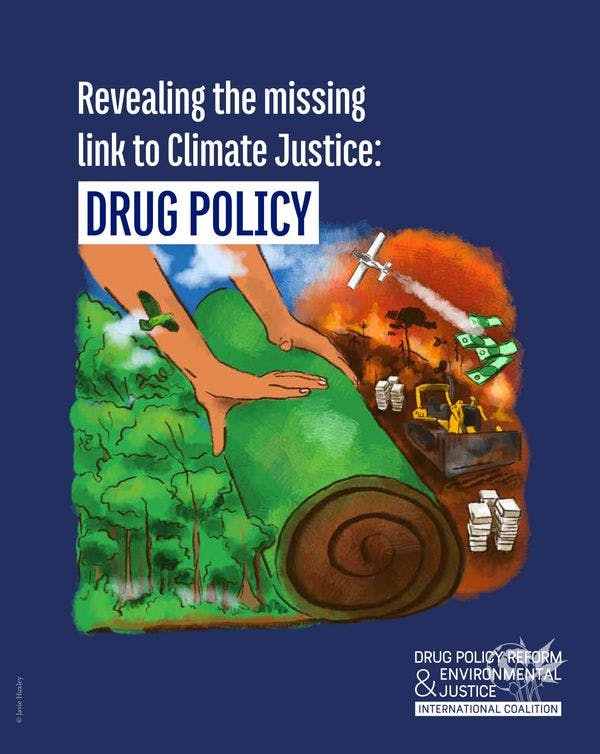Revealing the missing links to climate justice: Drug policy
“Forests are disappearing at an extraordinary and stubbornly persistent rate. In 2022, the world lost 4.1 million hectares of tropical primary rainforests – areas of critical importance for livelihoods, carbon storage and biodiversity – equivalent to a rate of 11 football pitches a minute.” —World Resources Institute
In the face of “extraordinary and stubbornly persistent” rates of tropical forest loss the UN’s International Panel on Climate Change (IPCC) has called for urgent action to protect and restore forests by strengthening their governance and management.
Action is needed now – and policy makers, environmental ministries, NGOs and civil society groups around the world are dedicated to implementing “urgent governance responses” to protect the planet’s largest carbon sinks, mitigate climate change, and head off climate catastrophe.
But their efforts will fail as long as those committed to environmental protection neglect to recognise, and grapple with, the elephant in the room. That elephant is the global system of criminalised drug prohibition, popularly known as the ‘war on drugs.’
It is increasingly being recognised that criminal actors are financing land grabs, deforestation, timber and wildlife trafficking and socially and ecologically devastating mining. And that authorities at all levels are often rubber-stamping and profiting from those illegal activities. However, this recognition stops short of naming the driver of these criminal activities.
Prohibition: the international drug policy regime – primarily devised and championed by countries of the Global North, and maintained by the United Nations – has created an unregulated and immensely powerful shadow economy.
That shadow economy is undermining environmental progress and governance in the world’s tropical forest frontiers. The jungles of South-East Asia, forests of West Africa and the rainforests of Central and South America are some of the planet’s largest carbon sinks and key to our climate future. This equatorial line also correlates to the world’s major drug trafficking routes.
Protecting ecologically fragile regions requires getting to the source of the shadow system that threatens them: the laws and treaties that make drugs illegal.
This report provides an introduction to this issue. It distils the ever-growing body of policy analysis and scientific evidence to expose how this shadow system functions, how it fuels environmental destruction and how it undermines climate mitigation strategies.
It is the first in a series, written by the academics, advocates and activists that comprise The International Coalition on Drug Policy Reform and Environmental Justice – the first ever global coalition focussed on this vital intersection between drug policy and the climate crisis.
It outlines three key ways in which drug policy impedes climate justice. First, the geographies of prohibition, pushing drug production and trafficking into remote and vital areas of biodiversity. Second, the reinvestment of drug profits into other environmentally harmful activities. Most importantly it highlights how drug policy creates the underlying conditions for environmental devastation. It explores how prohibitionist laws have empowered and enriched organised and violent criminal groups, and created an omnipotent shadow economy that destabilises state architecture, leaving officials to legislate in the interests of organised crime rather than people and planet.
Finally, it highlights the extraordinary opportunity before us to demolish this system of prohibition, and to build drug policy alternatives that work for public and planetary health.
At the report’s core is a plea to the environmental movement to take on board – strategically and programmatically – one crucial idea:
Drug prohibition is a key driver of organised crime, corruption and state capture in ecologically fragile regions. Addressing the climate emergency requires urgent, coordinated action by the environmental and drug policy movements, to replace prohibition with regulation that supports people and planet.
Here’s why this is necessary. And what we can do about it.
“Confronted with a situation that is growing worse by the day, it is imperative to rectify the ‘war on drugs’ strategy pursued in the region over the past 30 years. Prohibitionist policies based on the eradication of production and on the disruption of drug flows as well as on the criminalization of consumption have not yielded the expected results. We are farther than ever from the announced goal of eradicating drugs.” —Statement by the Latin American Commission on Drugs and Democracy, chaired by César Gaviria, former President of Colombia; Ernesto Zedillo, former President of Mexico; and Fernando Henrique Cardoso, former President of Brazil (2009)
